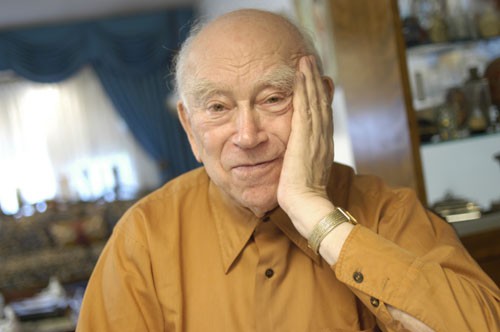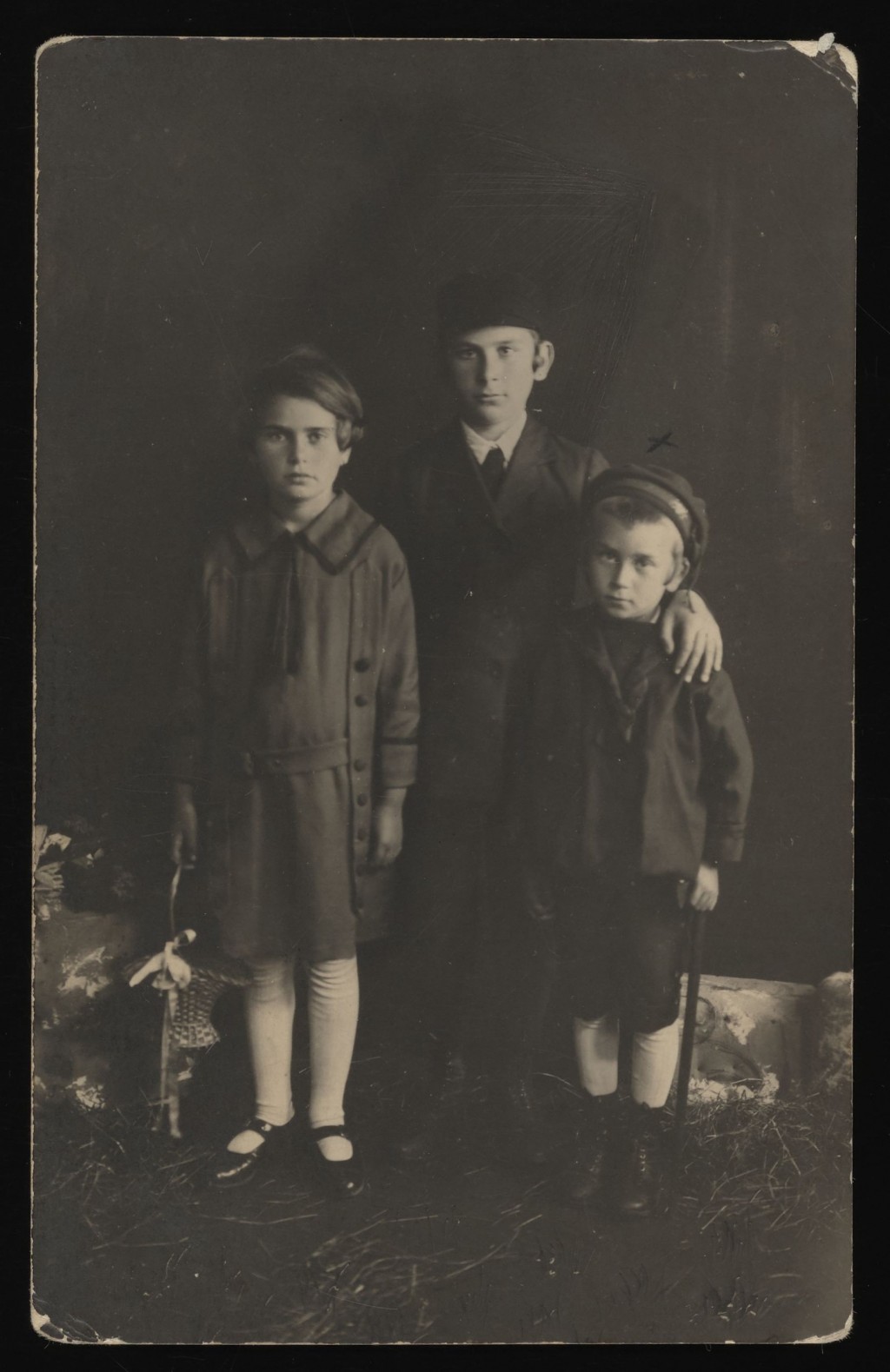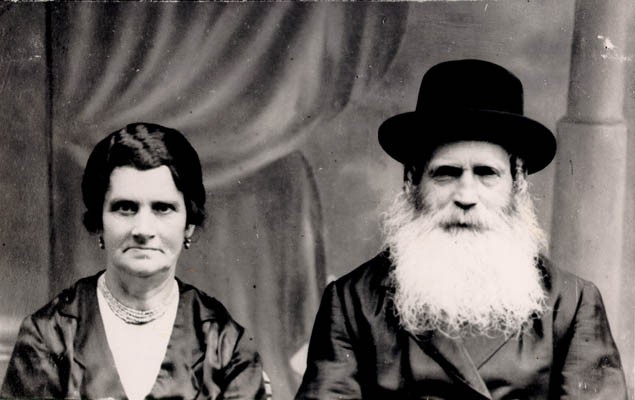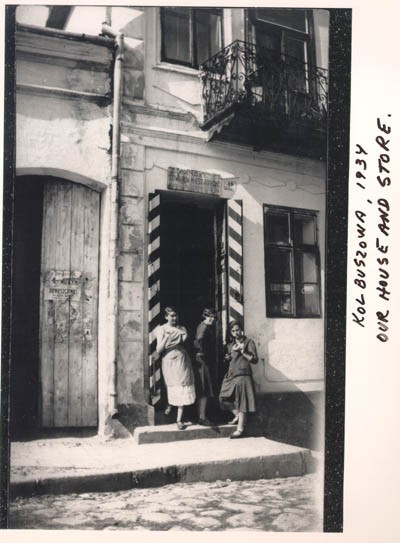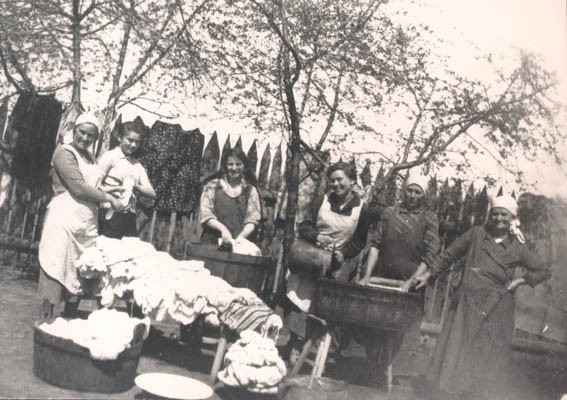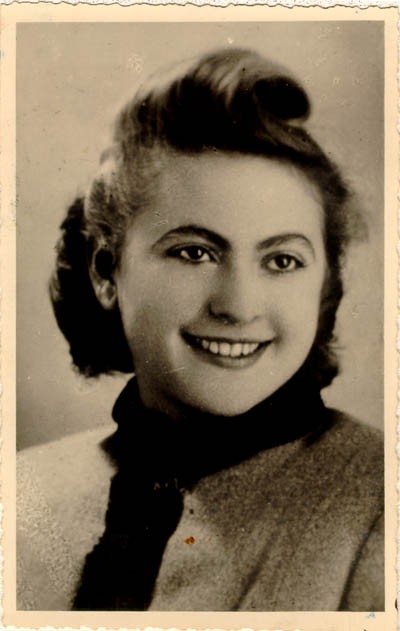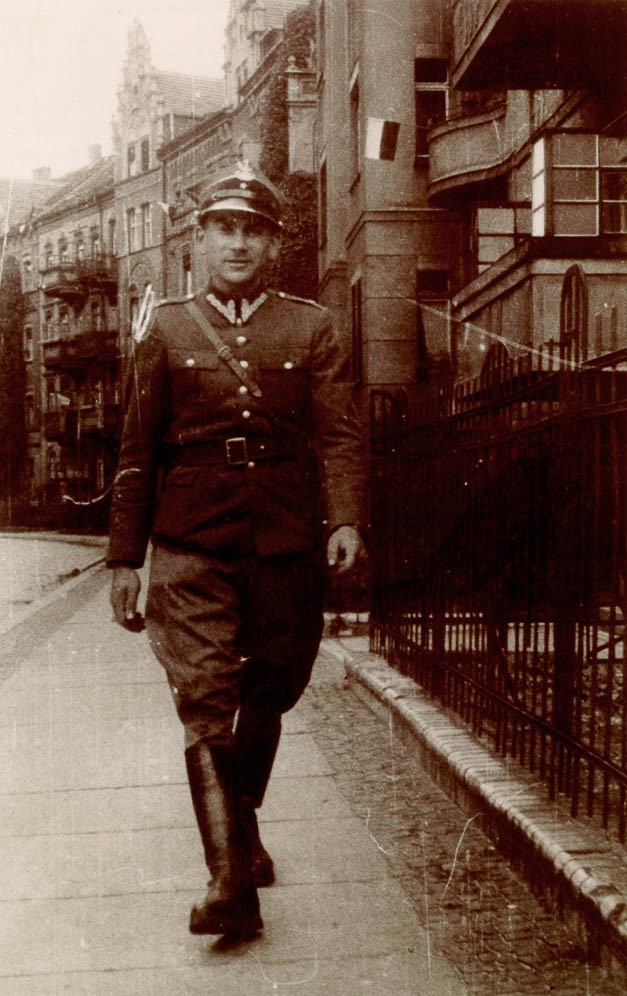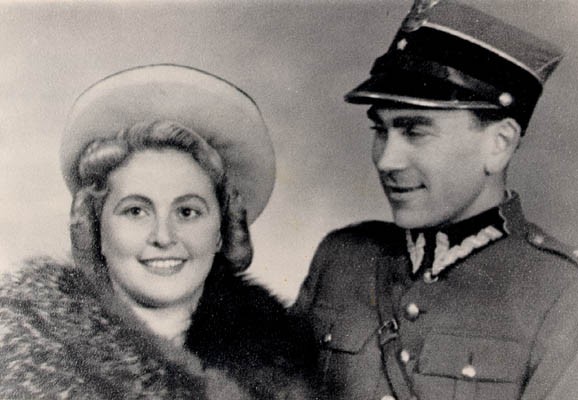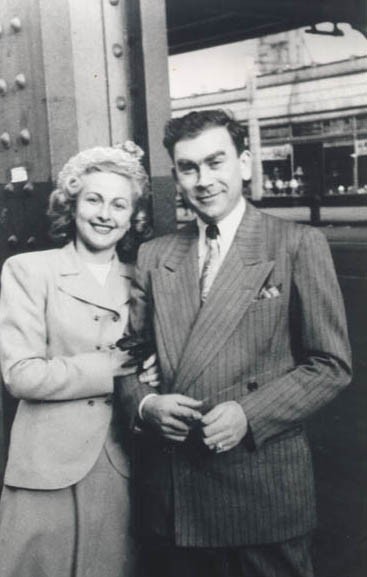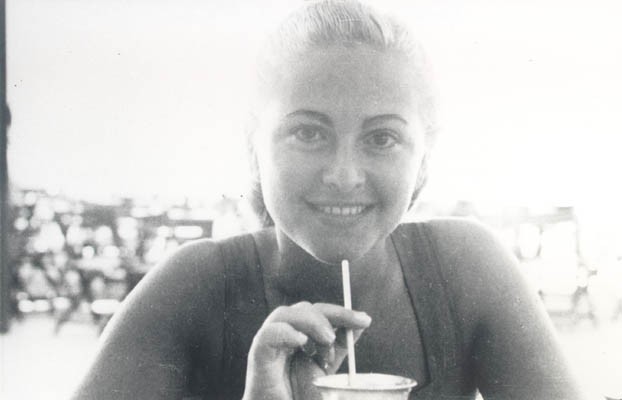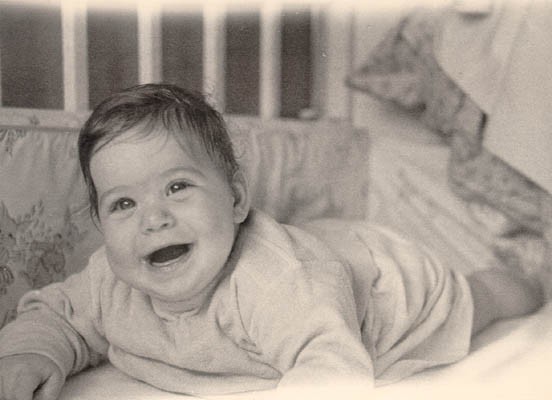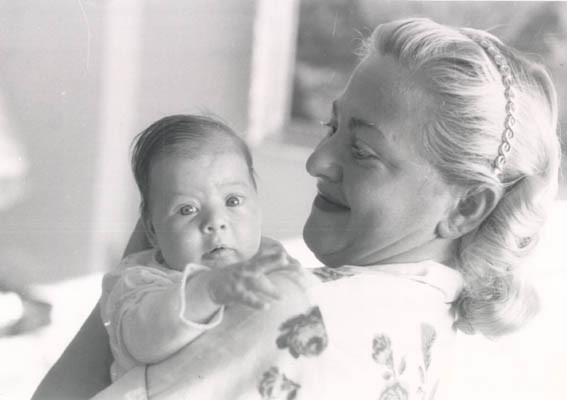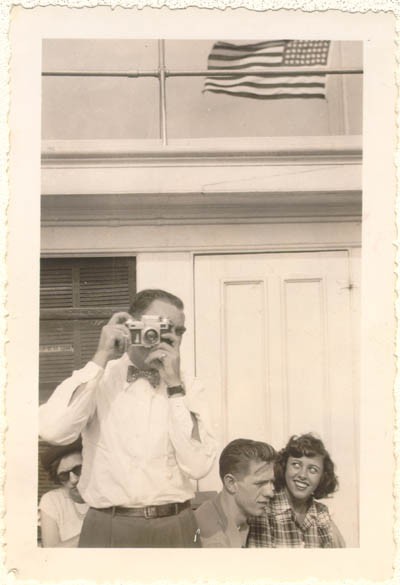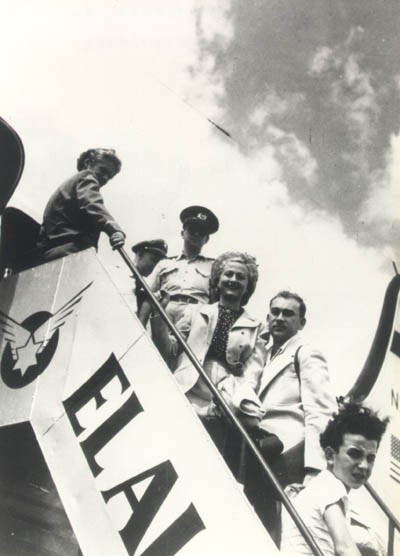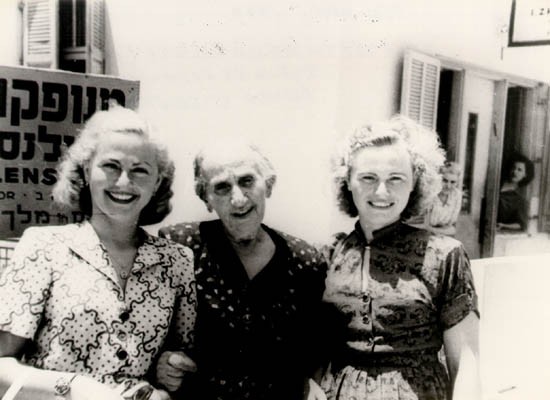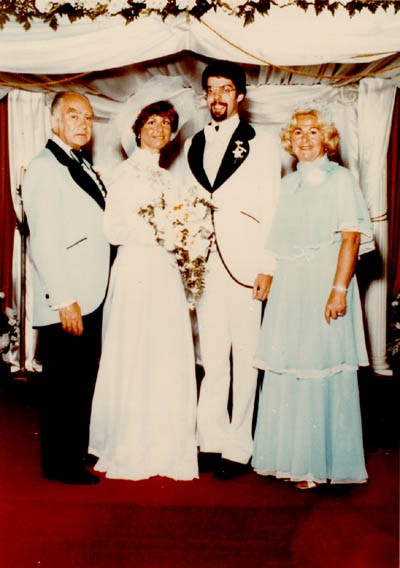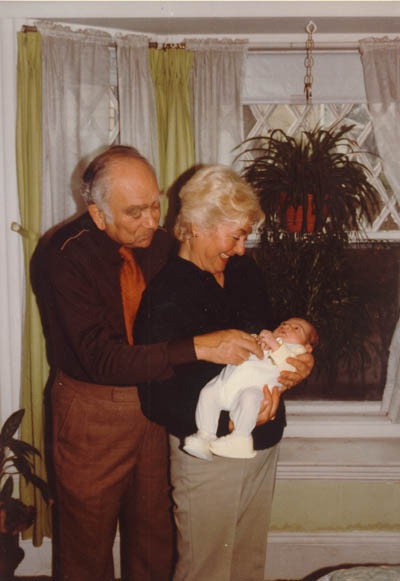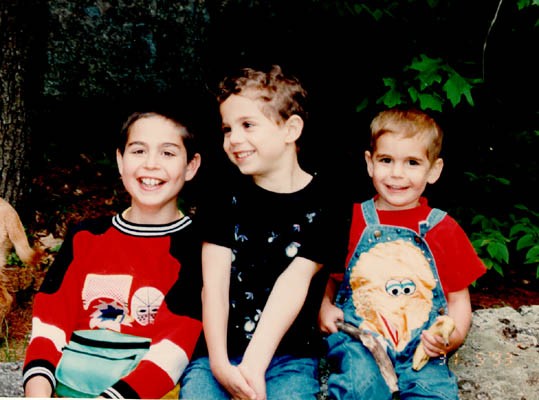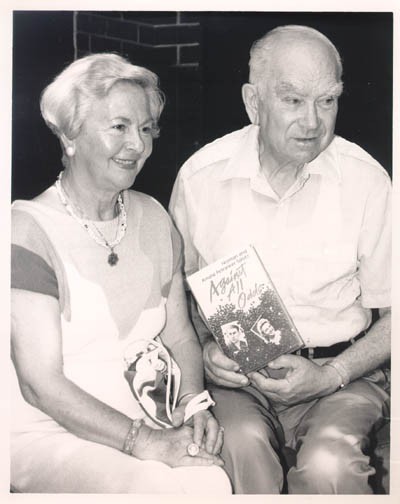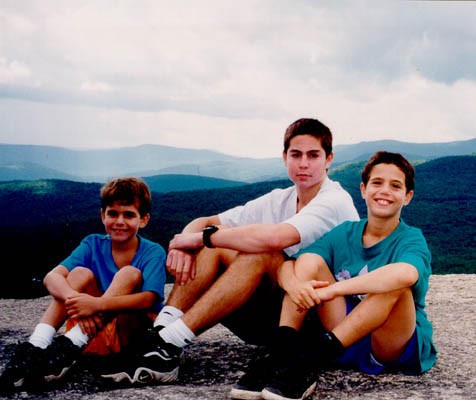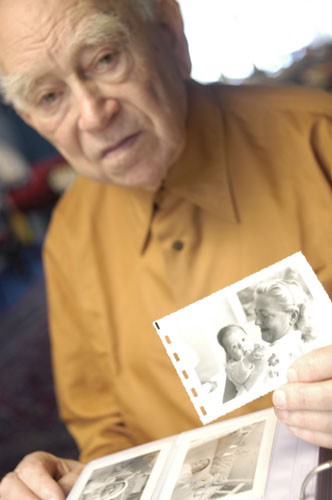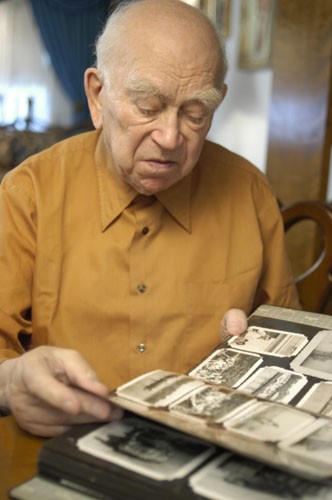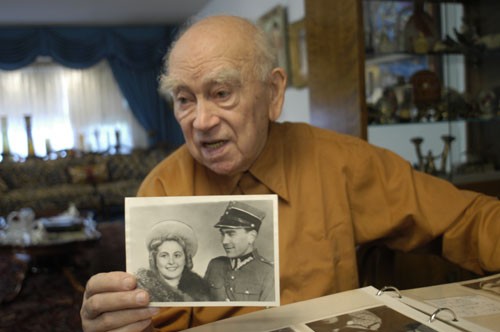
Life After the Holocaust: Norman Salsitz
With the end of World War II and collapse of the Nazi regime, survivors of the Holocaust faced the daunting task of rebuilding their lives. With little in the way of financial resources and few, if any, surviving family members, most eventually emigrated from Europe to start their lives again. Between 1945 and 1952, more than 80,000 Holocaust survivors immigrated to the United States. Listen to Norman Salsitz's story.
Life After the Holocaust documented the experiences of six Holocaust survivors whose journeys brought them to the United States, and reveals the complexity of starting over.
Norman (born Naftali) lived in the woods as a partisan before liberation by Soviet troops in mid-1944. He joined the Polish army, helping to liberate Krakow. He emigrated to the United States in 1947.
Listen to Norman's Story
Transcript of Interview with Norman Salsitz
Salsitz: I was born as Naftali Saleschutz. But during the war I had a few other names.
Narrator: Assuming false identities was a key to survival during World War II for Naftali, the youngest child of a well to do orthodox Jew in Kolbuszowa, Poland.
Salsitz: My name, for instance was, Tadeusz Jadach -
Narrator: masquerading as a non-Jewish Pole in the Polish underground, when he wasn't accepted as a Jew.
Salsitz: Then also it was, Anatoli Szczerbakow, which is a Russian name -
Narrator: when he joined a Russian partisan group with false documents.
Salsitz: Then it was Tadeusz Zaleski -
Narrator: in the Polish army after liberation, when it was still not safe to be openly Jewish.
Salsitz: And when I came to America, I got back to my real name Naftali Saleschutz. But for America, the Saleschutz was too long. People don't have time to spell. Everybody asked, "How do you spell it?" So, because I had a brother in America, and his name was Salsitz, so I changed it to Salsitz. And Naftali they thought it was too Jewish name, so I became Norman which I'm sorry 'til today, because I like Naftali much better than Norman. And this is how I remain.
I survived for two reasons... One was when my father was killed, he yelled, "Nekamah, nekamah, nekamah." It means, Revenge, revenge, revenge. Take revenge.
Narrator: On April 28, 1942, Norman's father was taken from their home and shot in the yard by the Gestapo. Hiding in the neighbor's attic, Norman saw and heard everything.
Salsitz: It is now 55, 60 years later, I still hear his... his screams. This was one that gave me strength. I have to live. Because I was the youngest. I was the only one to pay back. Pay back for my five sisters! Pay back for my... the sisters' husbands. Pay back for my nieces and nephews! Who would pay back? So this means that they were killed and nothing will happen to the people who did it. So, this was one legacy that it gave me strength. The second one was when my mother was taken away to Belzec with my five sisters to be killed in Belzec, she somehow gave to somebody a letter, and I got the letter from this person. I was this time in a camp. And she wrote to me, "You are my ninth child. You are the youngest. You are young. You are strong. You are smart. If somebody will survive, you will survive." 'Cause she believes that somebody will survive. She said, "After the war, go to your brother," because I had a brother in Palestine, "go to Palestine. Go to your brother," I had a brother in America, "and tell the whole world what the German murderers did to us!" So this is the reason that after the war I started to tell, even in the beginning people didn't want to listen. But I spoke, and they thought I have an obsession. Some people didn't like it. Later, 20 years later, people started to realize and they listened. Books came out. Movies came out. But I started to speak the first minute I left Poland, and I told the stories. And people thought that it is something wrong with me.
Narrator: Norman was part of a Polish partisan unit in the woods near his hometown of Kolbuszowa when the Russian army liberated the area.
Salsitz: I was liberated in the beginning of August 1944, and I right away wanted to go to the army, because I figured if I survived the war I have to fight the Germans and this was my aim...
Narrator: Still living under a false Polish identity, Norman joined the Polish army.
Salsitz: So, I was in this time we call it "Informacja Wojskowa," which means this was the political unit in the army.
Narrator: By January of 1945, he was stationed in Cracow as Head of Security for the county. His job, to help re-establish a civil government there. One of his main duties was to investigate ethnic Germans, who had gained favors from the Nazis; and to rid the government of Poles who had collaborated with the German regime. When Norman met Felicia Milaszewska, the secretary of a German construction firm, he assumed that she was one of these collaborators. He soon learned that Felicia was Jewish. Her real name was Amalie Petranker. She had survived the war by using a false Polish identity and played a major role in saving Cracow from destruction. Just a few days earlier, by accident, Amalie picked up the phone when the head of the German combat unit in Cracow called to give an order: to blow up the dynamite columns that had been secretly built in Cracow by the German firm she worked for. Instead of relaying the order, Amalie sent a warning to the Polish underground, the AK or "Home Army," of which she was a member. When Amalie met Norman, she gave him access to the blueprints for the dynamite columns. They soon found a way to help each other and other Jews who had survived the war.
Salsitz: You couldn't buy food, and people didn't have food. So I used - and we had everything, because from the army we had everything. And I used to send to her every day, bread and salami and butter and other things. Now, when the people who came out from hiding, they find out that there is somebody who survived and she is Jewish and she has food. And she was glad to give it to them. Also I gave her a lot of clothing. And she used to distribute to the people who came back with, with their... concentration [camp] clothing. They didn't - it was winter! Because this was in January or February, it was very cold. So, I gave it to her and I was very happy and I was very happy I could do it - unofficially.
Narrator: This was one of the happiest times in Norman's life. He was now a man of some power who could finally do something for his people. Norman and Amalie got married under their Polish names, because they learned about Polish Jews who survived the war, and returned to their hometowns only to be murdered by some local Poles. And because working closely with military and government personnel had convinced Norman that antisemitic sentiments were still a reality. He concluded that it was not safe to be openly Jewish.
Salsitz: And I wanted to leave, because I saw, even now, I have a good position and everything, but I had to masquerade. Why do I have to hide my identity? Why do I have to be Tadeusz Zaleski? Why can't I be myself?
Narrator: They both knew that the longer they stayed in Poland, the harder it would be to leave. Norman, who had been a Zionist from boyhood, worked secretly with the Bricha, an organization which helped to smuggle Jews out of Europe and into Palestine. They first fled to Munich, Germany. Under the British mandate, emigration to Palestine was still restricted for Jews. So, their journey would have to be illegal. While they set an escape plan in motion, they also registered for a visa to America, where Norman had a large family.
Salsitz: We said, which one will come first, Palestine or America? If America comes first, we go to America. And from America, we can always go to Palestine.
Narrator: In January of 1947, the Liberty Ship SS Ernie Pyle, set sail from Bremerhaven, Germany, to New York City.
Salsitz: It was a terrible storm and the ship, the boiler, everything broke and we almost drowned. The people, the men were in the basement, there were maybe 201 in this hole. Now, the women were 20, 25 in a cabin. We were very, very angry that the German people who went to America at this time, because a lot of Germans went to America - they had family here - they had the best cabins, because they had money to pay. They were sitting and eating and drinking and dancing and we were laying like - like dogs in... so this was very, very unfair. And I was so sick, I was laying outside on the deck. And I prayed to God that the ship should sink. I couldn't take it. So, then later the night before, somebody said "Tomorrow morning, we arrive in America." So, as sick we were, everybody dragged out the best suit with the best coat, and we were... and we waited - half a night we waited, staying on the deck waiting for the Statue of Liberty. And when the Statue... when we saw the Statue of Liberty, everybody from us started to cry.
Narrator: At the pier, they were met by Norman's older brother Albert, who had immigrated before Norman was born. Al provided shelter, but the welcome was not as warm as Norman had hoped.
Salsitz: See, my brother took me to his home. And I stayed with my broth... He had his own house, and I stayed with his house two weeks. After two weeks he said that I have to look for an apartment, because in America two weeks is enough... But, I - we found an apartment. It was very hard to find an apartment. So an Italian man took us in in his apartment. He had a small kitchen, and he had his bedroom. We had the living room, we slept there. Then later, he left for Italy. And - I remember his name was Rosario. He left for Italy and he said... He gave us over the apartment. It was very hard to find an apartment.
Narrator: After Amalie got her permit as a Hebrew teacher, the two of them lived on her salary.
Salsitz: See, would I come straight from a concentration camp, I would be very happy, because I would have enough to eat, I wouldn't be chased. But I already went through a period after the liberation 'till I escaped... I became already - I had a chauffeur. My wife had a cook. And I have a bodyguard... and I was - and I was admired, and I had a position. I don't know - So, then after this, when you came down - I fell down so drastically to America that I was nothing! What do you mean, nothing? I didn't know the language. I didn't know the people. I didn't have a trade. I didn't have a job. This... You became, you became worthless.
Narrator: Again, Norman turned to his new-found family for help. Again, he was disappointed.
Salsitz: And there was one cousin, and he... and they had the largest silk company in the United States. Lining for fur coats, silk. They were very well known. And so, I went to the... to them Sunday morning to the father to ask for a job. He said, "Well, I'm retired, but my son is the owner now from the hou - from the business, you go to him." They had about 300 people working there. I got dressed in my best... a European coat, a European suit, and a European hat... So, he looked and looked at me. And he took out a wallet from his pocket. He took out a 100 dollar bill and put it on the table. And he said, "Take it and get off my back." And when he said this, naturally I didn't take the hundred dollars. Now, tears filled up my eyes. Now, I couldn't... I couldn't answer anything, and I couldn't cry. So, I didn't take it. I run out and I was staying in the hallway. And I was crying. I was 27 years old and I was crying. A man goes through, and he says, "Hey, Mister, what's wrong? What's wrong?" So, I said to him, "Are you an American Jew?" He said, "Yes." So I said, "You know, you should've been in Auschwitz to be killed," to him. So he said, "Why are you cursing me?" he said... - because I said to him, "Why should my father be killed because he's a Jew and you live here and you have everything?" I didn't know what I'm saying, it was so... So he said, "Hey, why you're cursing me?" I said, I don't know. He said, "You know what? You ate lunch?" I said, "No." He says, "I want you should come with me. I'm going to eat lunch." So I went with him... So I told him the story.
Narrator: Joe Siegel was the second stranger who provided help. He was in the remnant business and gave Norman his first American job that paid a living wage. By day a peddler. By night, a member of various underground organizations training for armed combat in Palestine.
Salsitz: And then one day, one day I came there and they said, Well, Sunday morning your transport is going. And I came home and I said to my wife, "I'm going." And she said to me, "If you are going, you must know one thing... You are going, but you cannot come back to me. I will not wait for you. And I don't care what. Because I know you'll go and you'll be killed. And I lost too many people in - in Europe. And I don't want to have that. So, you can go, I cannot stop you, but you cannot come back to me."
Narrator: Bitterness and thoughts of suicide.
Salsitz: Who had to go to Israel to fight, if not a survivor of the Holocaust who was 27 years old, and especially when I had the schooling, what the Russians gave me, the schooling, so that I could... So even 'til today, I always say this is my biggest regret.
Narrator: He didn't go then, but in 1949, after the War of Independence, the Salsitzes were on the first plane to Israel.
Salsitz: The family was waiting for us... my wife's family, my brother's family. And they took us home. And they were very happy that naturally it's the first time that my wife saw her grandmother after the war. That she survived and my brother with the children. Now, we came... We wanted to remain. And we said we have nothing in America. We - I make a living, but we have no ties. So we said - I said I always wanted to live in Israel. My wife wanted to stay because she had there a sister. And her sister was starving. She had a farm, and they didn't have what to give to eat to the chickens. It was - it was terrible. I don't know if you know what means Zenar? Zenar was a time that everything was on cards, you couldn't buy this, you couldn't buy this. And the people didn't make money. It was a very terrible... because they had all the new immigrants. There was no industry. So we - so the family got together and they said, "You came too late." "Why too late?" "Would you come when you wanted before the war..." - I could be very important in the war. They didn't have professional soldiers. I was. And I wanted to fight for Israel, but the war is ended. And everybody - "So, what will you do? You will come over here and we will have two more mouths to feed. We don't have food. And what will you do? You are in America. You established yourself a little bit. You're making out alright. You go back, make money, send us the money." So, I bought 100 dozen children's socks and two suitcases. And I paid - I paid two dollars a dozen. And I went to Jersey City. Everybody had children, and I sold them for three dollars a dozen. Three dollars a dozen was cheap, but I made a dollar a dozen... And I sold in one day 100 dozen children's socks. And I made 100 dollars profit. When I made 100 dollars profit, this was the first day, I remember, so I said... People used to say that in America, money is laying on the street. It IS laying on the street, but you have to know how to pick it up. I said, this is for me. This is my country. If I could make the first day 100 dollars a day, so I will remain a peddler. And started to sell socks, then underwear, then dresses, then curtains and I wind up - and... with furniture. I sold only furniture. I had a warehouse. So, this was the beginning of being a peddler. So, I was about 10 years - 10 years a peddler 'till I became a builder.
Then later, when I started to make a living and when I went to Florida, and this I will never forget, and my wife went to Miami to buy a pair of shoes, and we go and we went into a store and I wanted to go to the bathroom and I see it's written for "Whites" and "Blacks." I wanted to - I couldn't believe it. I couldn't understand that in America... So I went back and there was a full - the store was full with people. And I started to yell - again, I talk a lot... So, I started to yell, "Don't buy here shoes! I wouldn't let you buy shoes." And she asked me "Why?" And I said, "Go and you will see! There are two fountains, two toilets... What do you mean this is for 'White' and 'Blacks'? You cannot - you cannot buy here." And I pulled her out, and she didn't buy the shoes. See, at this time for me the... we called them 'negroes' in this time, that they suffered and I could see them as I was second class citizen in Europe! So, this was very, very, very... it was terrible for me. Naturally, I have a lot of complaints to America. But we are allowed to have complaints. I can speak up!
Narrator: In 1956, Esther was born, their only child.
Salsitz: Now, when Esther was born so I think everything was completed. Because wouldn't I have a daughter, my life wouldn't be worth anything. Because why did I survive? To have a continuation! The Jews lived for so many years, and I had to have a continuation. Now she - I have a daughter, she has three grandsons. So, it means that Hitler didn't win the war. With me he didn't win the war. Because his - to win the war it means to destroy every single Jew. And with me, he couldn't do it.
[Norman sings, "Shlaf myn kindele, shlof myn jidele, shlaf myn kindele, shlof."]
Salsitz: When she was small, she was very unhappy, because she always asked question, How come all her friends have grandparents, have aunts and she doesn't have? It came Sunday, they came to visit. So as a matter of fact, she had a friend across the street and they... she had two sets of grandparents. So, she asked "How come she has two sets and I don't have even one?" So, naturally, we told her that they were killed. "Where are they?" "They are in Heaven... " I spoke to her about the Holocaust, but I think that I ah - I spoiled a lot, because I started to talk to her too early. I started to speak to her when she was small. She knows that from since she was four, five. And then she was so fed up that she tried to push it away. And then later, when I did with the grandchildren, she told me the same thing, not to try to spoil it, and not to try to influence and talk so much about it when they are too small.
Narrator: His office displays a lifetime of achievements. The family tree, Norman and Amalie - Esther who is now a lawyer in Boston and her husband Bruce, who is a recognized AIDS oncologist at Harvard - the three grand children; photographs of houses built by Norman's construction firm, three published books and proofs for the next two to come, a large cassette collection of Jewish music, plaques and acknowledgements from the various charitable and Holocaust organizations he has served, B'nai Brith, Israeli Red Cross, Israel Bonds, and United Jewish Appeal.
Salsitz: See, I'm in the United States almost 50 years. 50 or more... from '47 ah... more than 50... I never dreamt about the United States. Now I went through, I have my life here and family. And you always dream from your life. I never had a dream about the United States. Always when I have a dream, it's always a dream from home. Before the war. Dream from the Holocaust. I live with the past. And this is very - It's not good, but I live with the past. Alright, luckily, my wife is also a survivor. Would I have an American survivor probably... we couldn't live together... an American person. Because I don't think that somebody would take it. Ahm, but with her, she has the same problem as I. When she dreams she dreams also about her family, about her youth...
Narrator: In the evening, the 80-year-old Norman records songs, which, at 8 years of age, he harmonized with the Cantor in Kolbuszowa.
Norman's cassette playing: "The last time we sing it was the year when Kolbuszowa was destroyed in 1942. Since then, we sing it in our temple in Beth Am, which I also harmonize it with the Cantor." [Singing from the cassette.]
Narrator: The songs are to be used for choir practice in his temple, as teaching tools for schools, and for his own grandchildren.
Salsitz: I'm very proud of our heritage during all the time, of the religion and the history. But, I stop a little when it comes to God. I stop, because I have questions. I don't know if I believe in God or if I don't believe in God, I don't want to think about it, but if I believe, I'm very angry at him. Because if - like they say, if he ruled... runs the world, if he rules everything, where was he when they pushed in 4,000 people in the gas chamber in Auschwitz? And the crying and everything... He didn't hear it. If he didn't hear it, and he didn't help, so probably he could not help. And if he could not help, well, who needs him? But I - But this is - But Esther is more religious than we are. Because she doesn't have this experience... And I told her, if she will have children and the children will go to a religious school, I will pay for it. And I do. For all the three children. They go to Solomon Schechter, I pay for it. So, I am very, very proud what the Jews accomplished.
America took me in and nourished me, brought me back to health. And America did everything for me that I never dreamt that America would do it for me. When I see an injustice and it's done in America, I feel very bad, because I feel it is MINE and it shouldn't be an injustice. In Poland, everything they did, I had to take it for granted, This is the way it should be. But not in America. This MY America. The same thing it's YOUR America. Who are the Americans? WE!
Credits
Narrator: This program is part of "After the Holocaust," a series of audio profiles of Holocaust survivors in America. It was conceived and written by Regine Beyer and Arwen Donahue.
Studio production by Regine Beyer with Helen Thorington, engineer, at the New Radio and Performing Arts studio in Staten Island, New York.
The narrator was Jane Altman.
Special thanks go to the German Radio Archives, DRA, in Potsdam-Babelsberg; to Belgian producer Ronny Pringels, and to German producer Helmut Kopetzky for the use of sounds from their archives.
"After the Holocaust" is a production of the United States Holocaust Memorial Museum.
The interviews in this program were conducted for the Oral History Department of the United States Holocaust Memorial Museum, with financial support by the Jeff and Toby Herr Grant.
The Museum gratefully acknowledges Jeff and Toby Herr for making these interviews and this audio series possible.
Critical Thinking Questions
What challenges faced survivors of the Holocaust?
How did various countries respond to the plight of survivors?


